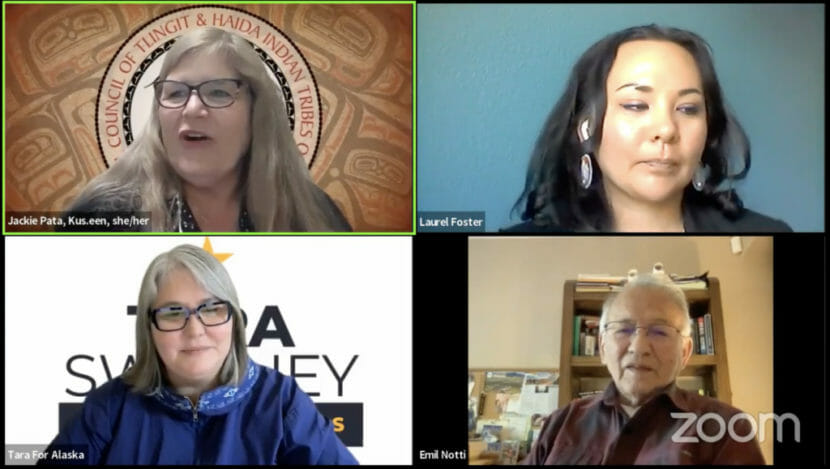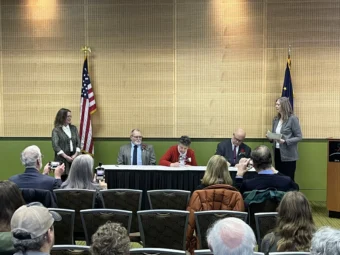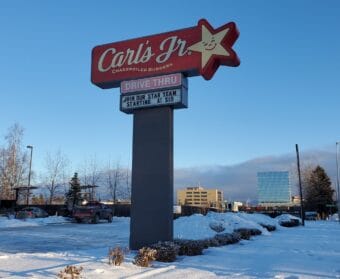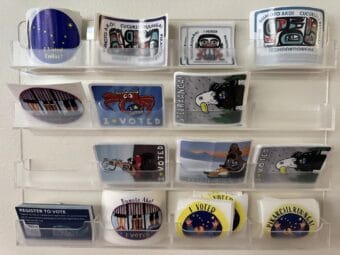
“I would be no more prouder in my life than to have an Alaska Native be the U.S. Congressman,” the late Alaska Rep. Don Young said at the 2011 Alaska Federation of Natives convention in reference to who might replace him, according to reporting by the Anchorage Daily News at that time. Of the 48 candidates vying to temporarily represent Alaska, at least four are Alaska Native – Laurel Foster, Emil Notti, Mary Peltola and Tara Sweeney. All were invited to Thursday’s virtual Meet the Candidates Native Issues Forum hosted by Central Council of the Tlingit and Haida Tribes of Alaska, known as Tlingit and Haida.
While Tlingit and Haida is not advocating for any particular candidate, President Chalyee Éesh Richard Peterson encourages people to vote for an Alaska Native candidate.
“Alaska, population-wise, is one of the smallest states. Yet, of the 574 federally recognized Alaska Native and Native American tribes, 229 of them are here,” Peterson said on the phone prior to the forum. “With ANCSA and all of the corporations, land, resource extraction, energy, military safety — a lot of it depends on Alaska Native lands and resources. So, we want somebody there who has familiarity, who understands the complexities of Alaska.”
The forum was “intended to engage our tribal citizens in voter participation in the upcoming special election,” said Tlingit and Haida First Vice President Jackie Pata, who moderated the forum. The candidates who were present had the opportunity to answer every question. The viewer count for the Facebook Live event hovered at around 110.
The candidates
Former state Rep. Mary Peltola, a Democrat, was only there for introductions before boarding a plane in Bethel headed to Anchorage and then Juneau. “We all, as Alaskans, know how travel goes,” she said. Peltola is Yup’ik from Bethel. She spent the few minutes she had talking about land issues, including Alaska Native people in five communities in Southeast Alaska that did not receive title to land through the Alaska Native Claims Settlement Act.
“I am in strong support of the landless tribes in Southeast. That’s been an ongoing issue for too many generations. And I’m thankful that Don Young was a champion of making sure that the landless tribes were allocated the few acres. Considering how big the Tongass is, we’re really talking about not very many acres for the original people from those communities,” she said.
Peltola said she supports lands into trust, is an advocate for subsistence, and a proponent of sovereignty. “I think we, as Native organizations and Native people, have the agency to take care of ourselves,” she said.
Placing tribal land into trust is a process that allows the federal government to acquire titles to property and hold it for the benefit of tribes. How the law governing land into trust applies to Alaska has been the source of conflicting U.S. Department of Interior opinions.
When asked why each candidate was running for U.S. Congress, nonpartisan Laurel Foster said she knows what it’s like to live in rural and urban Alaska, “and understand that they are completely different ways of living. And it’s important that our representatives are aware of that, and that our representatives and our leadership reflect the diversity within our state.” Foster is Cupik from Bethel, now living in Anchorage where she’s a senior paralegal at the Alaska Native Justice Center. Some issues she cares about are public safety within rural communities, access to fair and equitable healthcare and climate change. Foster highlighted the Missing and Murdered Indigenous People initiative – “My brother’s still a missing person. It’ll be 20 years, so that’s an issue that is close to my heart.”
Former Assistant Secretary of the Interior Tara Sweeney called herself “a Ted Stevens and Don Young Republican where I’m looking to meet Alaskans where they’re at and to embody their leadership styles of bringing people together. But when we need to, know how to fight, certainly know how to advocate.” Her campaign is focused on fostering a robust economy, through private sector growth, a strong labor force and healthy communities. “And so for 50 years, Don Young fought for this state tirelessly and I would like to continue that legacy.” Sweeney is Iñupiaq from rural Alaska currently living in Girdwood.
Nonpartisan Emil Notti, founder and the first president of the Alaska Federation of Natives, is against big money in politics and wants to draw attention to the environment. He wants to finish working on something he started 50 years ago “and that’s getting the land that villages didn’t get. Land claims are not done until we finish that.” Notti was a key participant in the negotiations that culminated in the Alaska Native Claims Settlement Act of 1971. Emil Notti is Koyukon Athabascan, born on the Yukon River. If elected the lone Alaska Representative, he said he’ll focus on relationship building, “Everything depends on your personal relationships, whether you can convince people that you have a worthwhile cause or not.”
Land into trust and climate change
Regarding land into trust for Alaska, Sweeney said she supports it and there’s a need for an Alaska-specific solution. “While this is sitting within the Department of the Interior right now, the role of Congress is to provide some clarity into the process,” she said. “What we’re seeing with land into trust in Alaska is that there has been a back and forth across five administrations that is focused on the underlining of whether or not the law permits Alaska land into trust and so if tribes in Alaska are striving for sovereignty and land into trust is a tool, then that’s a conversation worth having.”
Notti said village lands should go into trust. “If you lose the village lands, you’re going to lose your identity,” he said. “I think the regional corporations should put their muscle and technical ability behind getting land into trust for villages. I’m not worried about the regional corporations. They have plenty of lawyers and money and political push to defend themselves. But the village land, I think, is absolutely critical.”
Foster said land into trust can create different opportunities for tribal entities within Alaska. “It can expand jurisdictional boundaries for tribes and also expand the potential to negotiate use and sale of natural resources. If a tribe decides or believes that this would be beneficial to them and their people, I would support it as an option.”
On the candidates’ policy priorities to address climate change, Notti said, “First thing we have to do is get off of coal and oil for energy. We need to go to renewable energies. And the federal government would play a big role in that to encourage and build the infrastructure to do that.”
Foster cautioned against relying solely on renewable energy sources. “When you actually look into the production of renewable energy generation, they have their own negative impacts on the climate as well,” she said. “So I think balance between [fuel and coal, and renewable energy sources] is important.” Foster also emphasized the important role of individuals and communities in reducing the carbon footprint.
Sweeney added, “Working with the businesses inside of Alaska to voluntarily partner to reduce their carbon footprint is an option.” Regarding ocean acidification, she said a science-based approach is needed “and I would support authorization and appropriations of funds to continue the research and the mitigation practices with our local communities.”
The Tlingit and Haida candidate forum lasted about 50 minutes, ending with a recap of the special election important dates and process. June 11 is the last day to mail in your ballot. “Vote before Celebration because after you’ll be too tired to mail that envelope,” Pata said laughing. Celebration, the biennial festival of Lingít, Haida, and Tsimshian cultures, is happening in Juneau June 8-11.
James Brooks contributed to this report.



